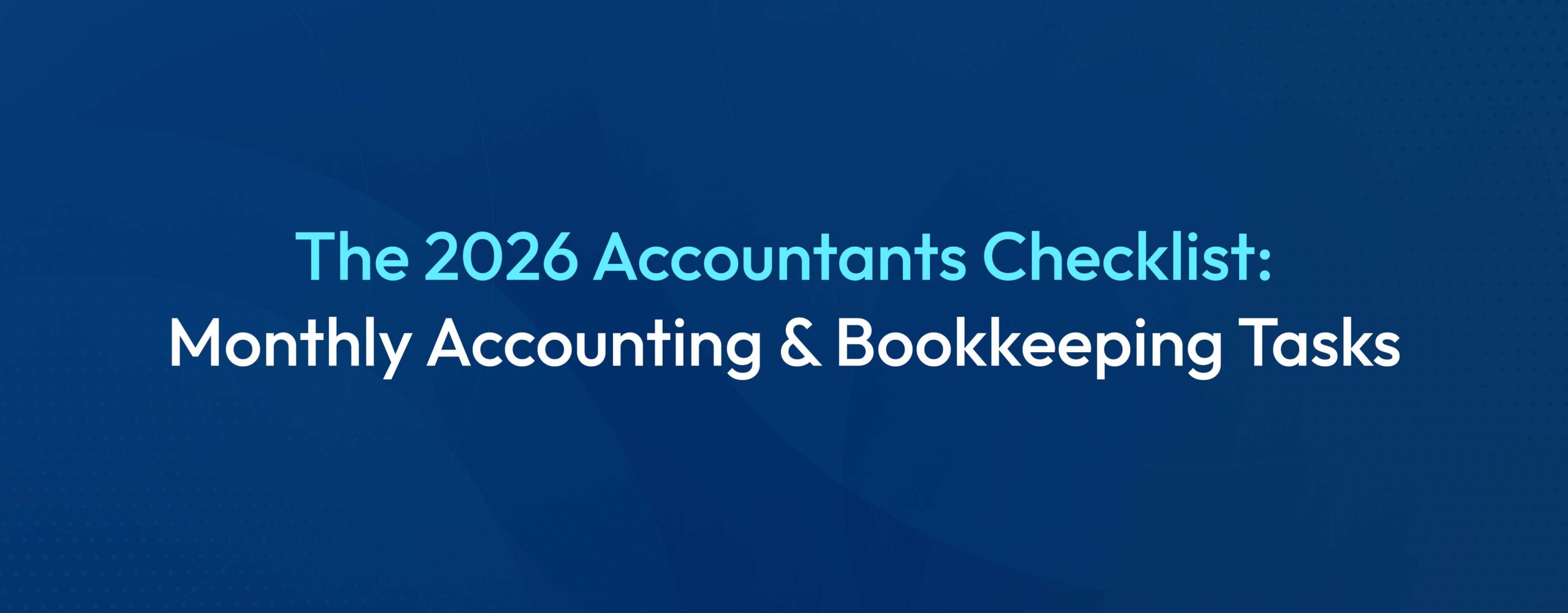
Life is busy as an accountant. But keeping up with monthly bookkeeping and accounting tasks makes things far easier. It also helps maintain accurate financial records and ensures that businesses in Ireland remain compliant with Irish tax laws.
For many accountants, outsourcing bookkeeping or accounting tasks has become a practical solution, saving time, reducing costs and freeing up resources to focus on client advisory and business growth. When considering these time-saving options, accountants should also evaluate accountant cost to ensure the best balance of service quality and budget efficiency.
Whatever the size of business you’re working with, following a solid set of best practices can make all the difference. It will save time, reduce unnecessary errors and ensure your finances are straight.
And if you’re handling multiple clients, outsourcing your monthly bookkeeping processes to a trusted partner can help maintain consistency, accuracy and compliance across all client accounts.
Let’s explore what a monthly bookkeeping checklist entails. We’ll also discuss the best practices accountants can implement, whether in-house or through outsourced accounting solutions to streamline their work, maintain accuracy and provide greater value to clients.
Good Business Health: The Importance of Monthly Bookkeeping Tasks
Accurate and up-to-date bookkeeping is essential for any business, big or small. It’s especially useful for accountants who manage client accounts, as it provides clearer insights into financial health.
As a professional accountant or bookkeeper, you’ll need to know the right basic tasks to focus on each month to set you up for success.
Regular, timely bookkeeping tasks ensure that your financial records remain up-to-date. It will also help you file taxes on time and provide your clients with accurate financial advice.
However, balancing daily operations and monthly accounting can be overwhelming. That’s why many Irish firms now turn to bookkeeping outsourcing service providers who handle monthly reconciliations, VAT returns, and payroll allowing accountants to focus on high-value advisory work.
Staying compliant with Revenue guidelines and local tax regulations is also a priority. Good bookkeeping whether in-house or outsourced helps mitigate potential risks and ensures complete compliance.
See related post: Beyond the Ledger: Navigating Effective Bookkeeping Practices
Essential Monthly Bookkeeping Checklist for Accountants
How can you keep a tight grip on your client’s finances? Here’s a breakdown of the basic accounting and bookkeeping tasks to follow every month.
(Tip: Many of these can be efficiently handled by an outsourced bookkeeping team for greater accuracy and time savings.)
| Monthly Bookkeeping Task | Description |
| Reconcile Bank Accounts | Match all transactions in accounting software to bank statements to ensure accuracy. |
| Review Financial Statements | Check the balance sheet, profit and loss statement and cash flow to ensure they reflect accurate finances. |
| Track Receivables and Payables | Ensure that outstanding invoices are followed up on and payments to suppliers are made on time. |
| Prepare VAT Returns | Ensure VAT returns are filed correctly each month. |
| Monitor Cash Flow | Track cash flow to avoid any future shortfalls and ensure adequate working capital. |
| Update Payroll Records | Correctly record and pay employee salaries, tax deductions and benefits. |
| Manage Petty Cash | Record all petty cash transactions accurately and ensure there’s no misuse of funds. |
| Review Transactions | Check all transactions are categorised correctly in the accounting software for accurate reports. |
| Reconcile Bank Accounts | Match all transactions in accounting software to bank statements to ensure accuracy. |
| Review Outsourcing Opportunities | Assess which recurring accounting tasks (like reconciliation, VAT prep, payroll, or reporting) could be outsourced to improve efficiency and consistency. |
By implementing these practices each month, you’ll keep financial records organised and help clients make better business decisions. Outsourcing monthly bookkeeping tasks can also ensure that these activities are completed reliably and on time even during busy seasons.
See related post: Outsourced Bookkeeping Services: How much bookkeepers cost in Ireland?
Daily and Weekly Bookkeeping Checklist
While monthly bookkeeping is essential, handling accounting tasks daily and weekly ensures that monthly closings go smoothly and that data is updated regularly. If you work with an outsourced bookkeeping partner, daily transaction updates and weekly reconciliation reviews can be included in your service package for real-time insights.

The Benefits of Hiring: Why Use a Bookkeeper?
While accounting software can automate many basic tasks, a professional bookkeeper ensures every transaction is correct and compliant with regulations. Even better, outsourcing bookkeeping provides flexibility letting you scale your resources and access skilled professionals without increasing full-time staff. This means fewer overhead costs, consistent reporting, and more time for advisory services.
The duties of a bookkeeper accountant include:
- Categorising transactions accurately.
- Ensuring financial records are organised and up to date.
- Assisting with VAT filing and compliance.
- Generating reports that help businesses track their financial performance.
Outsourced bookkeeping firms can handle all of these areas seamlessly through secure cloud-based platforms like Xero or QuickBooks, making collaboration simple and transparent.
What Are the Responsibilities of a Bookkeeper?
Bookkeeping tasks are governed by local tax laws and regulations, including the requirement for businesses to submit VAT returns and keep proper financial records.
So, what are the job duties of a bookkeeper?
- Maintaining accurate financial records: Ensuring every financial transaction is correctly recorded.
- Managing payroll: Ensuring employees are paid on time and that taxes are withheld correctly.
- Filing VAT returns: Ensuring VAT is correctly calculated and submitted to HMRC on time.
- Preparing financial reports: Generating profit and loss statements, balance sheets and cash flows.
Outsourced bookkeepers typically manage these responsibilities end-to-end leveraging advanced tools and Irish tax expertise to deliver accuracy, reliability and compliance without requiring an internal team.
See related post: Bookkeeping Solutions – Sage VS Xero
Bookkeeping Strategies for Small Businesses
Small businesses face many challenges when it comes to managing finances. In fact, 60% of small business owners think they aren’t knowledgeable enough when it comes to accounting.
Here are a few useful bookkeeping strategies for startups and small businesses to help them stay organised:
- Use Accounting Software: Cloud-based accounting software such as Xero or QuickBooks can automate many basic bookkeeping tasks and reduce the potential for errors.
- Keep Personal and Business Finances Separate: Ensure that personal expenses are not mixed with business finances. This can save time when preparing reports and filing taxes.
- Track Expenses: Encourage businesses to track every expense, no matter how small, to ensure they are tax-deductible and properly categorised. An accounting checklist small business helps with this.
- Plan for Tax Payments: Set aside a portion of revenue each month to prepare for VAT and income tax payments. This can prevent cash flow issues at the time of filing.
- Consider Outsourcing Routine Bookkeeping: By outsourcing ongoing accounting tasks such as reconciliations, VAT returns, and payroll, small businesses can reduce costs, stay compliant and focus on growth rather than administration.
See related post: Mastering Bookkeeping: Key Aspects and Effective Tips for Accuracy
Outsourcing Bookkeeping in Ireland: When to Consider It
Outsourcing bookkeeping and accounting tasks can be a game-changer for Irish accountants and business owners alike. Here’s when it makes sense:
- When managing multiple clients or complex ledgers.
- When struggling with staffing shortages or workload peaks.
- If you want predictable monthly costs and no training overheads.
- When your goal is to focus on strategic financial planning and advice rather than data entry.
Outsourced bookkeeping firms in Ireland provide scalable solutions for month-end close, VAT preparation, cash flow monitoring and payroll compliance tailored to Irish tax regulations.
Conclusion
You could say bookkeepers are at the heart of business in Ireland. They ensure the financial success of any business. Especially for accountants who manage multiple clients. But as business demands grow, monthly outsourcing bookkeeping tasks helps accountants maintain accuracy, efficiency, and scalability all while keeping costs predictable.
By following a daily, weekly and monthly bookkeeping tasks list and ensuring all legal requirements are met, small businesses can offer valuable services to their clients.
Good bookkeeping practices ensure that financial operations run smoothly. Turning these practices into good habits will mean you have the time to focus on growing your business.
Ready to streamline your monthly accounting and bookkeeping? Partner with Outbooks Ireland to access professional outsourced bookkeeping and accounting services tailored to Irish businesses.
FAQs about Accountants Checklist
What are the responsibilities of a bookkeeper?
What does a bookkeeper do on a daily basis?
How do I manage bookkeeping tasks for a small business?
What are the benefits of hiring a bookkeeper for my business?
Popular Bookkeeping Posts
- 5 Reasons Firms Should Outsource Bookkeeping in Ireland
- Cloud Bookkeeping VS. Traditional Methods: Why SMEs Should Make The Switch
- A comprehensive guide to choosing a bookkeeping partner in Ireland
- Top Tips for Efficient Bookkeeping Practices in Compliance with Irish VAT Laws
- The role of outsourced bookkeeping in Ireland’s growing green economy
- How to reduce bookkeeping costs for Irish startups through outsourcing
Parul is a content specialist with expertise in accounting and bookkeeping. Her writing covers a wide range of accounting topics such as payroll, financial reporting and more. Her content is well-researched and she has a strong understanding of accounting terms and industry-specific terminologies. As a subject matter expert, she simplifies complex concepts into clear, practical insights, helping businesses with accurate tips and solutions to make informed decisions.











